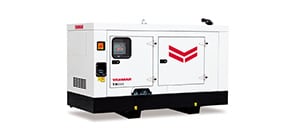NEDO 綠色創新基金項目選擇氫燃料船用發動機和 MHFS 開發,以建造零排放船舶。
VISION01節能型社會
目標
擴大能源的可能性。隨時隨地使用負擔得起且安全的電力、電力和熱力,並僅在必要時使用。
我們對 VISION 01 的產品、服務和支持

能源管理系統
我們通過燃料效率診斷和能源運行狀態分析,為優化設施範圍的能源使用做出貢獻。這就是我們幫助實現能源效率的方式。

工業用柴油機
我們開發超高燃油效率、大功率發動機,以擴大我們的工業柴油發動機領域。這些發動機還符合最新的歐洲 Stage V 標準。
一致的可持續發展目標

與VISION 01相關的待解決的社會挑戰

通過業務貢獻
YANMAR POWER TECHNOLOGY CO., LTD.

挑戰
在全球脫碳勢頭不斷增強的背景下,進一步減少溫室氣體排放成為國際航運領域亟待解決的問題。 2021 年 10 月,日本政府和航運業宣布了到 2050 年實現國際航運溫室氣體淨零排放的目標,國際海事組織於 2018 年通過了初步戰略,將國際航運排放量至少減少 50%到 2050 年,計劃在 2023 年修訂並進一步加強這一戰略。
- 參考:到 2050 年實現國際航運溫室氣體淨零排放,航運零排放項目
解決方案

新能源產業技術開發機構 NEDO 於 2022 年 1 月啟動了該項目以開發下一代船舶,以建造零排放船舶。YANMAR Power Technology 與川崎重工和日本發動機公司 J-ENG 聯手開發氫燃料船用發動機和 MHFS *1,並在該項目中發揮積極作用。
這 3 家公司同時致力於氫燃料船用發動機的開發,川崎開發中速 4 衝程發動機,YANMAR開發中高速 4 衝程發動機*2,J-ENG 開發低速 2 -衝程發動機。到2026年,我們將覆蓋可用於滿足廣泛需求的完整髮動機陣容,併計劃與航運公司和船廠在營運船舶上進行試點,這將給社會和經濟帶來好處。
Through joint investment in a newly established company, HyEng and with MHFS developed at Kawasaki, the three companies are working together to build a hydrogen-fueled propulsion system by developing common technical elements such as basic combustion analysis, materials and sealing surfaces that meet ship classification regulations, and sharing testing facilities.
- *1 MHFS: Marine Hydrogen Fuel System: hydrogen fuel marine tanks and fuel supply system
- *2 YPT計劃首先開發雙燃料氫燃料中速發動機,然後是氫燃料高速發動機。
Swipe to see the right side of this picture.

- Source: Kawasaki Heavy Industries, Yanmar Power Technology, Japan Engine Corporation
提供的價值
Through hydrogen-fueled engines, we will contribute to the reduction of GHG emissions in a wide range of applications, with ocean-going vessels as the main focus, and also domestic vessels. In addition, we will provide a hydrogen-fueled engine system that ensures the necessary redundancy for ships, saves space in the engine room, and satisfies NOX and SOX regulations. The project will also help the revitalization of the domestic maritime industry.
YANMAR ENERGY SYSTEM CO., LTD.

Contributing to the realization of a carbon-free society 100% hydrogen-fueled cogeneration manufactured by German company 2G to be sold in Japan and overseas by the end of FY 2022.
挑戰
The pursuit of energy efficiency and the use of renewable energy to reduce greenhouse gas emissions are essential to achieve a carbon-free society. Wind power generation and solar power generation are also spreading in Japan, but the fluctuation of energy production remains a challenge, due to the characteristics of dealing with nature. Therefore, expectations are high for hydrogen as a new energy source. Hydrogen energy can be produced from various energy sources, including renewable energy, and has the advantage of not emitting CO2 when used. Businesses are increasingly focusing on this as a medium- to long-term key to achieving carbon neutrality.
解決方案
Yanmar Energy System has concluded a sales agreement for the 100% hydrogen-fueled cogeneration system manufactured by the German company 2G Energietechnik GmbH. The agreement is for Asia, including Japan, the Middle East, and Africa, and the system will be used in Japan within this fiscal year. We plan to handle a total of 5 models* with a power generation capacity of 115 kW to 750 kW.
By November 2022, the machine will be installed at Yanmar Energy System’s Okayama Test Center for validation of construction and maintainability. In 2023, we will also open a facility where customers can see the actual product, and propose this system as a solution that includes hydrogen supply for various environmentally friendly projects and companies. We will also promote technological development so that gas engines made by Yanmar are also compatible with hydrogen fuel.
In the future, we will continue to propose total energy solutions, including CHP and hydrogen generators, and strengthen our initiatives to solve our customers’ energy challenges and realize a carbon-free society.
- * Depending on the results of the test, the models and actual figures may change.


提供的價值
By promoting hydrogen-fueled cogeneration systems that generate electricity and heat efficiently, businesses can curb the amount of fossil fuels and grid electricity in their business activities, thereby contributing to a decarbonized society.

 農業
農業
 營造
營造
 海上商用
海上商用
 海上娛樂
海上娛樂
 能源系統
能源系統
 緊湊型電源產品
緊湊型電源產品
 遊艇
遊艇
